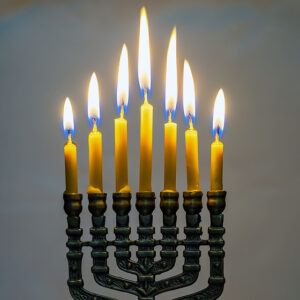EBSTEIN: A Chanukah Primer

The season is upon us, and with that comes a primer on Chanukah so you can be in the “holiday know.” It is common knowledge that Chanukah lasts eight days and that candles are lit each night, with the number lit being the night of the holiday. But that’s just a start. Here is more background to greet the holiday.
The Chanukah Story Itself
Back in 190 BCE, the Greeks occupied Israel and imposed their will. They required that Jews help finance their military through taxes and house their soldiers in their homes. They placed a Zeus statue in the Temple courtyard and banished Jewish observances, including the sabbath and circumcision of newborn boys.
When the Greeks demanded that Jews sacrifice a pig to Greek idols, a line was crossed. In 166 BCE, a group of Hasmoneans led by Mattathias had enough, and violence ensued. Complete chaos broke out, and a war began between the Jews and the Greek army.
Mattathias and his five sons led the Maccabees in guerrilla warfare against a much better-equipped Greek army. After Mattathias was killed, the Maccabees were led by Judah, Mattathias’s son. Their army expanded from 3,000 to 12,000 men, though still significantly smaller than the 50,000-men Greek army.
Through guile, courage, and hit-and-run tactics, the Maccabees eventually defeated the large army, though it took five years. The Jews returned to the Temple and shattered the statue of Zeus. The story goes that, once inside the Temple, the Jews found one small flask of oil to light a flame. After the flame was lit, one night’s worth of oil lasted eight days.
Hence, Chanukah is referred to as the “festival of lights,” and we light candles for eight nights to celebrate the many miracles—both the long-lasting oil and the defeat of the mighty Greek army. There is a ninth candle, referred to as the “shamash,” which lights the candles. Its meaning has been interpreted as a symbol of the power of light over darkness.
Some Chanukah Traditions
Food: Latkes, fried potato pancakes made of shredded potatoes with onions, are eaten. It’s best not to count the carbs or fat grams when enjoying. There are latke variations, including sweet potato, broccoli, zucchini, cottage cheese, and much more. Apple sauce and sour cream typically accompany the latke. One other Chanukah delectable is jelly-filled fried donuts called “sufganiyot”—a kid’s treat.
Dreidel: A betting game is played by spinning a four-sided “dreidel.” Each side has a Hebrew letter to remind us that “A big miracle happened here,” where the first letter of each significant word is displayed. Players settle their bets based on how their dreidel lands. The typical ante includes small coins like pennies and nickels, or better yet, chocolate coins called “gelt.”
Singing: Blessings are said, and songs are sung during candle lighting. It is still my family’s favorite part of the holiday. Some songs are very simple such as “Dreidel, Dreidel, Dreidel,” and others are sung in Hebrew, in rounds, and require more knowledge.
Gifts: Probably because of the timing that Chanukah falls near Christmas and Christmas is the ultimate gift-giving holiday, Chanukah has become gift-focused as well. It wasn’t originally viewed as a time to exchange presents; in some homes, there can even be a gift for each night. I won’t opine my thoughts.
Timing: Unlike Christmas, which always falls on December 25, Chanukah falls on the 25th of Kislev, a Jewish calendar month. That was the date that the Jews took control and rededicated their Temple. The use of the Hebrew calendar explains why Chanukah falls on different dates in the Gregorian calendar.
The meaning we give to Chanukah is layered and a personal preference. For some, it is a time to look inward and apply a larger purpose to the “Festival of lights.” Peter, Paul, and Mary proposed their interpretation with their song, Light One Candle. They suggest a universal candle representing justice, hope, and peace.
I was taught to view the holiday through a Jewish lens of history and heritage. This is the 50th year marking the passing of Abraham Joshua Heschel, a great sage and Rabbi who lit our world with love, meaning, and goodness. He shared that for us to do God’s work, we need to recognize the spark of the divine within us and treat fellow humans accordingly.
That would be an excellent takeaway for this holiday of light.
Please follow DVJournal on social media: Twitter@DVJournal or Facebook.com/DelawareValleyJournal

